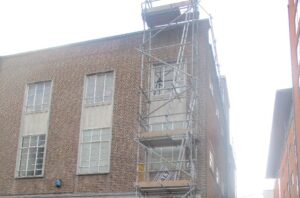Two construction companies fined after worker injured during lifting operation
Two construction companies have been fined after a worker was seriously injured when a part of an air conditioning plant fell on him while it was being lowered from a roof.

Southwark Crown Court heard that on 10 November 2017 three roofers had been working on Bromley High Street in London, finishing off a large roof refurbishment project. The workers were instructed to dismantle a decommissioned air conditioning plant and remove it from the roof in high winds. As part of the plant was being lowered, it became detached from the rope and hook. It fell and struck one of the workers on the pavement below, fracturing his left femur.
An investigation by the Health and Safety Executive (HSE) found that only a basic manual gin wheel was provided to lower the parts, no one was assigned to supervise and none of the workers had any formal training on carrying out lifting operations or slinging loads. There were also other failings at the site relating to working at height, control of asbestos, emergency arrangements, manual handling and a total lack of any welfare facilities for the workers.
NMC Surfacing Limited (NMC) who operate nationally, had subcontracted the roof refurbishment work to a smaller local business, Fraden Contracts Limited. The client was unaware NMC had subcontracted the construction work. The Court heard NMC provided them with modified versions of Fraden’s risk assessment records with all references to Fraden erased.
NMC Surfacing Limited of Railway Court, Reading Bridge House, Reading, who had been the Principal Contractor for the project, was found guilty after a trial of a breach of Regulation 13(1) of the Construction (Design and Management) Regulations 2015. The company was fined £350,000 and ordered to pay £45,122.36 in costs.
Fraden Contracts Limited of Northside House, Mount Pleasant, Barnet who had been contracted by NMC Surfacing Limited to carry out the work, had already pleaded guilty to a breach of 15(2) of the Construction (Design and Management) Regulations 2015. This company was fined £14,000 and ordered to pay £6,015.26 in costs.
HSE inspector, Andrew Verrall-Withers, commented after the hearing: “Little thought was giving to planning the lifting operation by the companies and it was the workers who identified passing members of the public were at risk and borrowed some barriers to try and protect them.
“It is vital construction companies do not assume that because workers have been in an industry for years, that they automatically know everything about how to safely use equipment.
“A worker suffered an injury which means he can no longer work as a roofer despite three decades of previous experience. He, or a passing member of the public, could have been killed.”
Note to editors
- The Health and Safety Executive (HSE) is Britain’s national regulator for workplace health and safety. We prevent work-related death, injury and ill health through regulatory actions that range from influencing behaviours across whole industry sectors through to targeted interventions on individual businesses. These activities are supported by globally recognised scientific expertise. www.hse.gov.uk
- More about the legislation referred to in this case can be found at: legislation.gov.uk/
- HSE news releases are available at: http://press.hse.gov.uk
- For more information on lifting equipment at work please visit our website https://www.hse.gov.uk/pubns/indg290.htm
The post Two construction companies fined after worker injured during lifting operation appeared first on HSE Media Centre.